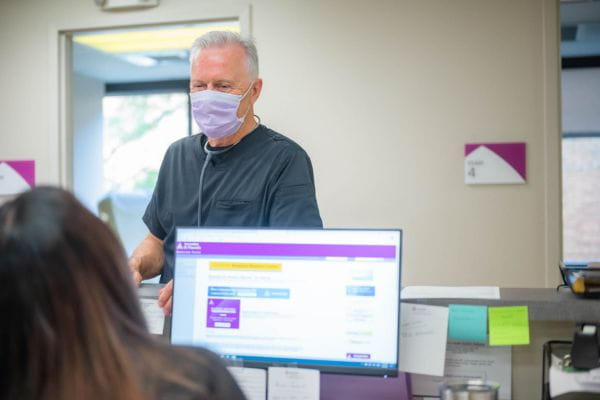This new medication, called Factor 11, is being tested by those who cannot otherwise take blood thinners due to the risk of bleeding.
The clinical trial began enrolling patients in the Fall of 2023 and will be following patients over the course of the five year study. More than 2,000 patients have been enrolled in Asia, Europe, Central and North America, with the goal of 15,000 patients over the entire course of the trial. Ascension St. Vincent’s is one of only two hospitals in the state conducting the trial.
Anticoagulant medications, or blood thinners, are often used to reduce the body’s ability to form blood clots, which is an important factor for patients with atrial fibrillation (AFib). Those with AFib are five times more likely to have a stroke due to blood clots.
“These medications work by inhibiting the clotting process and reducing the ability of the blood to form clots,” said Dr. Alain Bouchard, cardiologist and Principal Investigator for the Ascension St. Vincent’s clinical trial. “In our blood, we have proteins that are called coagulation factor. If you cut yourself, it’s important to have a mechanism to stop the bleeding. The coagulation factor is very important just for that.”
However, for patients with AFib, because of the irregular heart beat that the condition creates in the heart, the ventricles may not be pumping blood as efficiently from chamber to chamber. This can lead to a pooling of the blood where clots are more likely to form. There are medications available to prevent stroke, however, there is a risk those treatments can cause excessive bleeding.
"We need better medication. We need medication that not only will prevent a stroke but also will not cause this bleeding," said Bouchard.
The trial at St. Vincent's uses Factor 11 inhibitors. Bouchard explained there are 12 coagulation factors in the human body that normally help stop bleeding. When stroke is a risk, blood clotting factors have to be blocked to prevent too much clotting. Some medications block certain factors which can lead to increased bleeding.
Bouchard explained a Factor 11 inhibitor may be the key to finding the fine line between too much clotting and not enough.
"Factor 11 is there as a bystander if you cut yourself but it is very essential to form clots. There is a feedback mechanism from Factor 2 to Factor 11 to really make sure that there is clotting. Makes the clot even bigger. That is one that is important to block," said Bouchard. "Studies so far have shown that using Factor 11 you can reduce the complication of a blood clot without causing increased risk of bleeding."
\Ascension St. Vincent’s is testing two different types of medication during this trial. The first is an injectable version of Factor 11, which has been effective for roughly a month. This form of the drug is specifically designed for those who are at an elevated risk for bleeding and otherwise unable to take any form of blood thinner.
The second study is in pill form, comparable to Apixaban, sold under the brand name Eliquis.
“This is a really exciting time in medicine, and we are very fortunate to offer these options to patients,” said Dr. Bouchard. “The future for patients with AFib is very bright.”
For those interested in learning more, please contact the Ascension St. Vincent’s Research Department at 205-212-6031.
